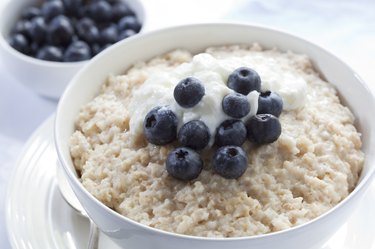
Whether you're a pro athlete or a weekend warrior, excelling in your sport depends on maintaining adequate glycogen levels. Be sure to include food sources of glycogen in your daily diet. Complex carbs like fruits, vegetables and whole grains are some of the healthiest glycogen-boosting foods.
What Is Glycogen?
Video of the Day
Glycogen is a branched polymer of glucose, the simple sugar created by carbohydrate metabolism and the body's main source of energy. During intense, intermittent exercise and long-duration workouts, this compound is broken down in muscle tissue to free glucose molecules. The muscle cells oxidize these molecules to produce adenosine triphosphate, a compound that provides energy for muscular contraction.
Video of the Day
Glucose is stored in the muscle tissue until it is needed. Once the activity begins, stored glucose is used and depleted at a rate proportional to the intensity of the activity. High-intensity exercise breaks down glycogen at a faster rate, therefore using up the available stores more quickly. Long-duration exercise also depletes glycogen stores, but at a slower rate.
In both cases, depleted glycogen stores negatively can affect workout performance. According to a research review published in Nutrition & Metabolism in December 2015, low glycogen stores impair skeletal muscle function during exercise. Even when there are other sources of fuel available, low muscle glycogen leads to fatigue and may reduce the athlete's ability to train and compete.
Glycogen Foods to Focus On
As an athlete or gym-goer, it's important to keep your glycogen stores topped up. The best way to do this is to eat enough carbohydrate foods. Carbohydrates come from plant foods — primarily fruits, vegetables and grains.
These nutrients can be divided into two categories: simple and complex. Simple carbs have a simpler chemical structure that is more easily metabolized into glucose, providing an immediate source of energy.
Carbohydrates that are high in fiber and come packaged with protein and fats are complex carbs. They have a more complex structure and digest slowly, sending a steady stream of glucose into the bloodstream.
- Brown rice
- Beans
- Potatoes and sweet potatoes
- Barley
- Oatmeal
- Quinoa
However, there are times when simple carbohydrates are ideal. According to an article published in Nutrition Today in January 2018, simple carbohydrates that are easily digestible and absorb quickly are ideal during and immediately after exercise to speed glycogen resynthesis. One of the review's authors works as a paid consultant for the Alliance for Potato Research & Education, but these findings are confirmed by several other studies.
Healthy sources of simple carbs include:
- Fruits
- Energy bars
- Bread
- Low-sugar sports drinks
During and immediately before and after intense or long-duration exercise, choose simple carbs; any other time, complex carbohydrates are a better choice for steady blood sugar levels and other health benefits due to their high content of fiber and nutrients.
Building and Maintaining Glycogen
Athletes need more carbohydrates than the general population to ensure adequate muscle glycogen stores. The recommended dietary allowance (RDA) for most adults is 130 grams per day. Individuals who engage in regular physical activity need an amount matching the frequency, duration and intensity of exercise sessions.
The American College of Sports Medicine currently recommends athletes get 2.7 to 4.5 grams of carbs per pound of body weight each day. For a 155-pound person, that's 418 to 698 grams per day — well above the RDA for the general population. Meeting those needs takes a dedicated and focused dietary approach.
Eat carbohydrates throughout each day, not only when you're preparing for a tough workout or athletic event. Whole-grain toast, oatmeal, yogurt and berries all are carbohydrate- and nutrient-rich breakfast foods. For lunch, a rice bowl with veggies and tofu hits the spot, and at dinner, pair protein with sides of sweet potato, spinach and quinoa.
- BBA Clinical: "Glycogen Metabolism in Humans"
- ACE: "The Three Primary Energy Pathways Explained"
- Nutrition & Metabolism: "Glycogen Availability and Skeletal Muscle Adaptations With Endurance and Resistance Exercise"
- MedlinePlus: "Complex Carbohydrates"
- Nutrition Today: "High-Quality Carbohydrates and Physical Performance"
Was this article helpful?
150 Characters Max
0/150
Thank you for sharing!
Thank you for your feedback!